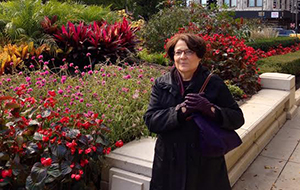 Chris Ash earned a history degree from Case Western Reserve University in 1972. Instead of heading elsewhere to pursue a career like most of her fellow graduates, she stayed. Ash became an administrator in the Department of Geology, embarking on what would become an accomplished 42-year career with the university.
Chris Ash earned a history degree from Case Western Reserve University in 1972. Instead of heading elsewhere to pursue a career like most of her fellow graduates, she stayed. Ash became an administrator in the Department of Geology, embarking on what would become an accomplished 42-year career with the university.
“If anyone had asked me when I graduated that I’d be here 42 years later, I’d have told them they were nuts,” Ash said.
Throughout her four-plus decades at the university, Ash has seen incredible change, from groundbreaking discoveries, to campus and neighborhood development, to the comings and goings of thousands of students, faculty and staff.
Some of Ash’s fondest memories come from those early years with the geology department, which also happen to coincide with some of the most exciting years for the department as a whole.
“I was lucky to have been with the department when Professor (Donald) Johanson (Department of Anthropology) and faculty and students from geology discovered the famous ‘Lucy’ fossils in Ethiopia,” she said. “Back then, we had about 15 faculty members and 20 graduate students. The geology department was like a family.”
It was around this time that Ash began working toward a Master’s in Business Management degree, taking classes in what was then the Enterprise Building—now Nord Hall.
“By the time I was getting my MBA, it was still very new for women to pursue that degree,” Ash said. “I was fortunate to have the mentors I had during that time.”
Ash left the geology department in 1976 for the Dean’s Office of Case Institute of Technology (science and engineering) as an administrative manager and then a budget manager. From 1987 to 1992 she led the business office for the colleges, which joined Case Institute of Technology with Western Reserve College under one dean. In 1992, when engineering split off to become the Case School of Engineering, she became associate dean of administration and finance for the school.
Ash continued to advance, becoming vice president of financial planning and budget in 2004 and vice president of university planning and institutional research four years later.
“The university kept making me offers I couldn’t refuse,” she said. “It’s not that I never looked for other jobs, it’s just that something keeps you here.”
Now, after 42 years of service to the university, Ash is going to “give someone else a chance.” Starting in January, she will work part-time to help train her replacement before officially retiring in April.
Although Ash won’t be on staff, she plans to continue her bond with the university.
“I hope to volunteer and continue my education by taking history and art classes,” she said. “I grew up here and spent my whole life here. It’s home.”
When asked what she would miss most, Ash didn’t hesitate.
“The people,” she said. “Being exposed to all of these great students, faculty and staff each and every day has been a privilege. It’s bittersweet. You start thinking about all the people you won’t see every day.”
Read more about Ash in this week’s five questions.
1.What is your preferred mode of transportation and why?
Fast cars. I love speed. My husband and some of my friends won’t drive with me because I have a bit of a “lead foot.”
2. What’s next on your reading list?
I’m a fan of author Lincoln Child. He and author Douglas Preston collaborate to write the Agent Prendergast series of novels. I just ordered another book from the series to begin reading soon.
3.What has been the most rewarding moment for you while at Case Western Reserve University?
I can think of many of them, but the most recent one was being part of the leadership retreat for the university’s strategic plan implementation in November. It was rewarding to see faculty, staff and students work together to move the institution forward.
4. If you had a day to do whatever you wanted, how would you spend it?
I’d probably spend it with chef Bobby Flay. Cooking is one of my hobbies, so I would love to watch him cook and pick up pointers.
5. What is your favorite thing about Case Western Reserve?
The students. It’s uplifting to see and feel all the energy and creativity. I enjoy the sense of renewal every year when the new students arrive. There is so much hope in May when another class graduates and goes out into the world. They’re pretty special.
